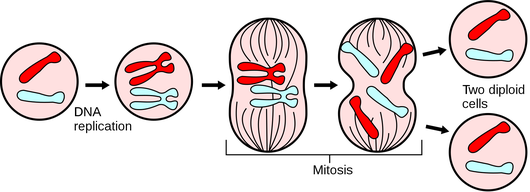Mitosis refers to the complex multi-stage process by which eukaryotic cells divide (the simpler process of prokaryotic cell division is known as binary fission).
The details of mitosis vary across eukaryotic species, but the overall aim of mitosis is to duplicate all the DNA in the nucleus in order to produce enough genetic material for the two daughter cells. To this end, the parent cell's DNA tightly coils itself into chromosomes in advance of mitosis for efficient packing and replication. See the figure below for a simplified illustration of mitosis: each chromosome is replicated, then the two copies of each chromosome are separated into the two new daughter cells.
Errors in DNA replication result in mutations, which usually leads to cytolysis (cell death). Yet in rare cases, a mutated cell can continue to divide, creating cancerous tissue.
The term "mitosis" comes from the Greek for "thread" and was coined by Walther Flemming in 1882 when he first observed long, spindly chromosomes in dividing cells.
